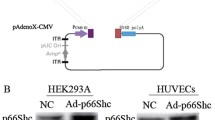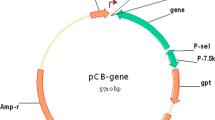Summary
In order to investigate the effect of replication-incompetent adenovirus vector expressing MDA-7/IL-24 on tumor growth and apoptosis of human hepatocellular carcinoma (HCC) cell line SMMC-7721 and normal liver cell line L02, the recombinant replication-incompetent Ad.mda-7 virus vector was constructed and infected into the HCC cell line SMMC-7721 and normal liver cell line L02. RT-PCR was performed to examine the expression of MDA-7 mRNA. The concentrations of MDA-7/IL-4 in culture supernatants were determined by using ELISA. MTT and Hoechst staining assay were applied to observe the inhibitory and killing effects of MDA-7 on the HCC cells. By using flow cytometry, the apoptosis, cell cycle and proliferation of SMMC-7721 and L02 cells were measured. The results showed recombinant replication-incompetent virus expressing MDA-7/IL-24 was constructed successfully, and RT-PCR revealed that it could mediate the high expression of the exogenous gene MDA-7/IL-24 in SMMC-7721 and L02 cells. The expression of MDA-7/IL-24 proteins in the culture supernatant was detectable by ELISA. Ad.mda-7 infection induced apoptosis and growth suppression in SMMC-7721 cells and an increased percentage of HCC cells in the G2/M phase of the cell cycle, but not in L02 cells. It was concluded that mda-7/IL-24 gene, mediated with replication-incompetent adenovirus vector, could selectively induce growth suppression and apoptosis in HCC cell line SMMC-7721 but without any toxic side-effect on normal liver line L02.
Similar content being viewed by others
References
Venook A P. Treatment of hepatocellular carcinoma: too many options? J Clin Oncol, 1994,12(6):1323–1334
Lebedeva I V, Sauane M, Gopalkrishnan R V et al. Mda-7/IL-24: Exploiting Cancer’s Achilles’ Heel. Mol Ther, 2005,11(1):4–18
Jiang H, Lin J J, Su Z Z et al. Subtraction hybridization identifies a novel melanoma differentiation associated gene, mda-7, modulated during human melanoma differentiation, growth and progression. Oncogene, 1995, 11(12):2477–2486
Huang E Y, Madireddi M T, Gopalkrishnan R V et al. Genomic structure, chromosomal localization and expression profile of a novel melanoma differentiation associated (mda-7) gene with cancer specific growth suppressing and apoptosis inducing properties. Oncogene, 2001,20(48):7051–7063
Gopalkrishnan R V, Sauane M, Fisher P B. Cytokine and tumor cell apoptosis inducing activity of mda-7/IL-24. Int Immunopharmacol, 2004,4(5):635–647
Sarkar D, Su Z Z, Lebedeva I V et al. mda-7 (IL-24) mediates selective apoptosis in human melanoma cells by inducing the coordinated overexpression of the GADD family of genes by means of p38 MAPK. PNAS, 2002,99(15):10 054–10 059
Kawabe S, Nishikawa T, Munshi A et al. Adenovirus-mediated mda-7 gene expression radiosensitizes non-small cell lung cancer cells via TP53-independent mechanisms. Mol Ther, 2002,6(5):637–644
McKenzie T, Liu Y, Fanale M et al. Combination therapy of Ad-mda7 and trastuzumab increases cell death in Her-2/neu-overexpressing breast cancer cells. Surgery, 2004, 136(2):437–442
Lebedeva I V, Su Z Z, Sarkar D et al. Induction of reactive oxygen species renders mutant and wild-type K-ras pancreatic carcinoma cells susceptible to Ad.mda-7-induced apoptosis. Oncogene, 2005,24(4):585–596
Su Z Z, Lebedeva I V, Sarkar D et al. Melanoma differentiation associated gene-7, mda-7/IL-24, selectively induces growth suppression, apoptosis and radiosensitization in malignant gliomas in a p53 independent manner. Oncogene, 2003,22(8):1164–1180
Lebedeva I V, Su Z Z, Sarkar D et al. Melanoma differentiation associated gene-7, mda-7/interleukin-24, induces apoptosis in prostate cancer cells by promoting mitochondrial dysfunction and inducing reactive oxygen species. Cancer Res, 2003, 63(23):8138–8144
Author information
Authors and Affiliations
Corresponding author
Additional information
Congjun WANG, male, born in 1971, M.D., Ph.D.
Rights and permissions
About this article
Cite this article
Wang, C., Xue, X., Yi, J. et al. Replication-incompetent adenovirus vector-mediated MDA-7/IL-24 selectively induces growth suppression and apoptosis of hepatoma cell Line SMMC-7721. J. Huazhong Univ. Sci. Technol. [Med. Sci.] 28, 80–83 (2008). https://doi.org/10.1007/s11596-008-0120-y
Received:
Issue Date:
DOI: https://doi.org/10.1007/s11596-008-0120-y




